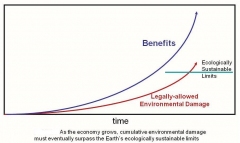As the Millenium Ecosystem Assessment Synthesis begins:
Everyone in the world depends completely on Earth's ecosystems and the services they provide, such as food, water, disease management, climate regulation, spiritual fulfillment, and aesthetic enjoyment.
But if we want to preserve the ecologically functioning biosphere that we depend upon for so much, we are going to have to define within the law what it is we want to preserve or we will lose it for-ever to the mounting tsunami of cumulative impacts.
The growing human ecological footprint has made untenable the assumptions on which our current environmental decision-making structure is based. The central goal of property and environmental law must shift from promoting endless growth in net benefits to maintaining the ecological systems we need to survive and prosper.
SEHN was founded in 1994 by a consortium of North American environmental organizations concerned about the misuse of science in ways that failed to protect the environment and human health. Since 1998, SEHN has been the leading proponent in the United States of the Precautionary Principle as a new basis for environmental and public health policy. The Science and Environmental Health Network engages communities and governments in the effective application of science to protect and restore public and ecosystem health.
The Science and Environmental Health Network:
Encourages the practice of science in the public interest and the accurate interpretation of scientific information;
Identifies information, ethical concepts, and logic that have the potential to provoke essential change; and
Helps communities, organizations, and governments develop and implement sound environmental policies.
 In a new article published in the Barry Law Review, Science & Environmental Health Network SEHN Legal Director Joe Guth argues that we have long assumed we can tolerate the endless growth of small increments of environmental damage in the pursuit of economic growth. But now, the mounting cumulative impact of the human enterprise is threatening the long-term habitability of the biosphere. The law will have to abandon its use of cost-benefit analysis to justify individual environmental impacts and instead adopt the goal of maintaining the functioning ecological systems that we are so dependent upon.
In a new article published in the Barry Law Review, Science & Environmental Health Network SEHN Legal Director Joe Guth argues that we have long assumed we can tolerate the endless growth of small increments of environmental damage in the pursuit of economic growth. But now, the mounting cumulative impact of the human enterprise is threatening the long-term habitability of the biosphere. The law will have to abandon its use of cost-benefit analysis to justify individual environmental impacts and instead adopt the goal of maintaining the functioning ecological systems that we are so dependent upon.